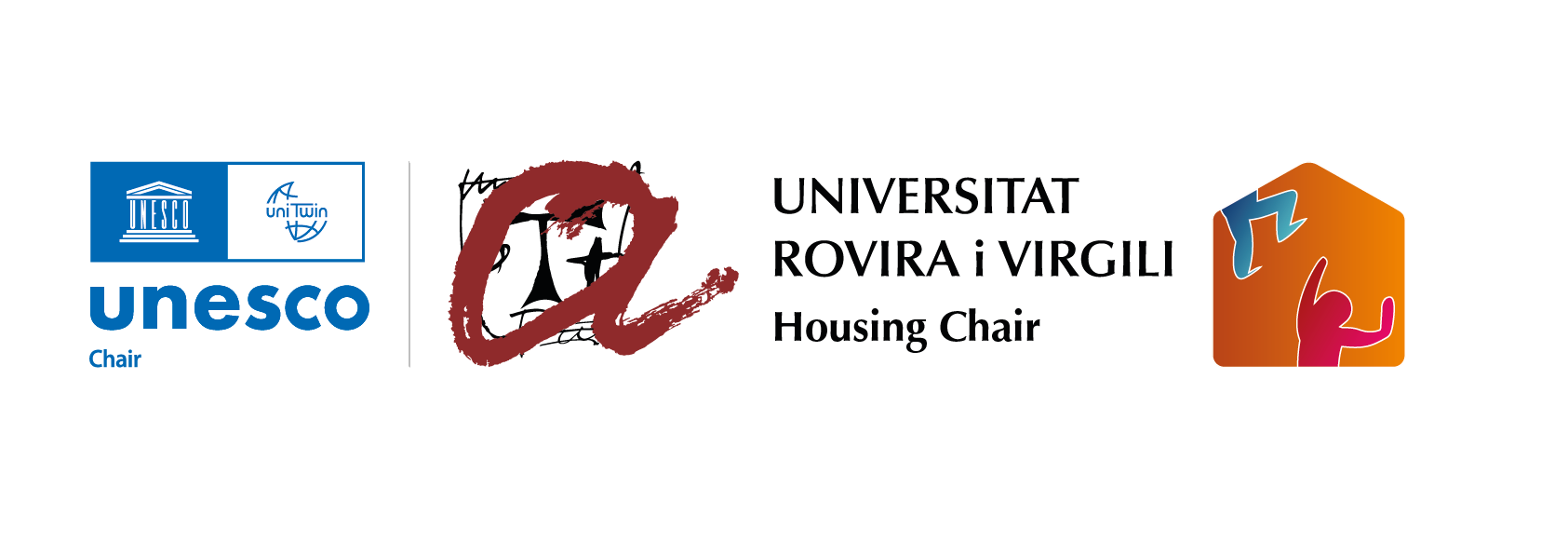The researchers of the UNESCO Chair of Housing have taken part and edited dozens of publications, some of which are highlighted below. In addition, the Chair has pushed forward the collection “Law of housing” by the publisher Tirant lo Blanch.
Finally, the Chair publishes the multimedia magazine “Housing”, which can be found in full here.
European Housing Studies
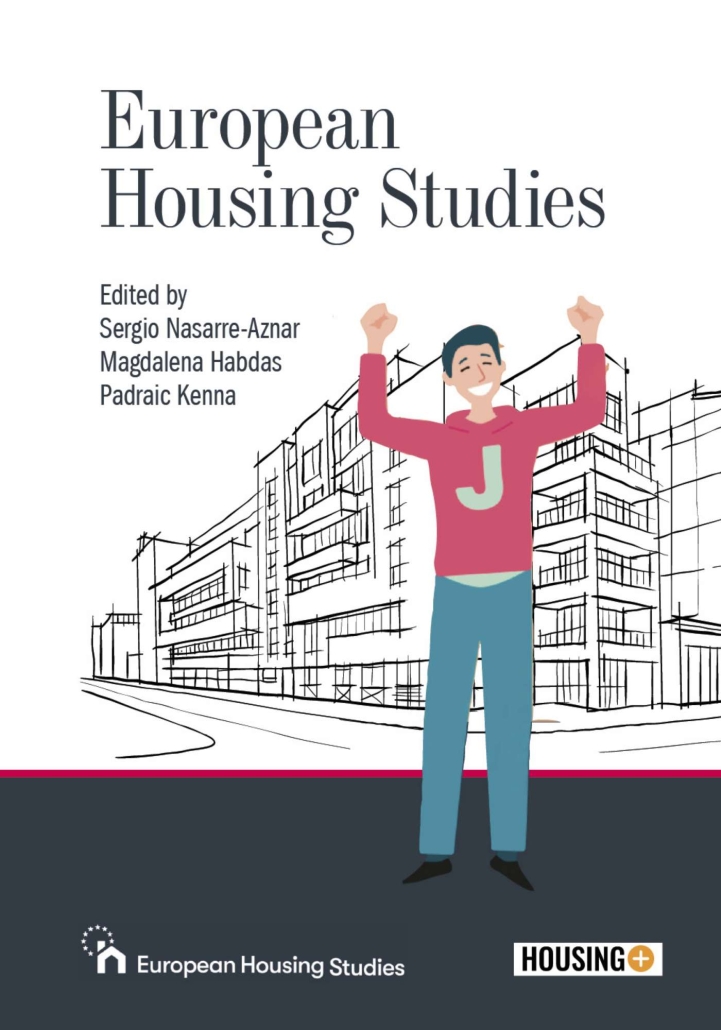 European Housing Studies is a unique book of its kind. It is the result of the work undertaken by 31 multidisciplinary housing experts from 11 European countries over three years. Each contributor has provided expert and condensed information and commentary on a variety of topics in structured chapters that range from the theory of housing studies and the right to housing to the development, access and loss of housing. It also contains sections devoted to housing as a market, housing professionals, housing and technology and the interactions between housing, city, territory and environment.
European Housing Studies is a unique book of its kind. It is the result of the work undertaken by 31 multidisciplinary housing experts from 11 European countries over three years. Each contributor has provided expert and condensed information and commentary on a variety of topics in structured chapters that range from the theory of housing studies and the right to housing to the development, access and loss of housing. It also contains sections devoted to housing as a market, housing professionals, housing and technology and the interactions between housing, city, territory and environment.
The book has been designed to be used as both a stand-alone handbook for those interested in a single volume containing all the current key topics related to housing, and as a coursebook linked to the online European Housing Studies course (https://www.housingstudies.eu), which has been designed by the Housing+ consortium and co-funded by the European Union.
See the table of contents of the book and of the EHS here.
Las políticas de vivienda en el ámbito local (Housing policies at the local level)

This book is a guide to better understand the current housing situation and to know what are the specific lines of action that can be carried out by local authorities in this area. The reader will find a first academic approach to the housing problem without biases, as well as the tools on how to prevent, treat or react to it: generation of new housing and new forms of land tenure, increase in the supply of existing housing, treatment of empty housing and squatting, how to progress towards affordability, how housing is interwoven in the municipality and in the territory and issues related to governance and sustainability.
Also far from purely theoretical digressions, the tools are explained in detail, since the work is the result of research and synthesis resulting from the authors’ experience in drawing up rigorous local housing plans in the south of Catalonia, which is based on a prior diagnosis, necessarily to plan any action. The work has an exemplary and replicable vocation.
In short, this is an essential work for mayors, councilors, local and regional housing managers and technicians, associations and foundations dedicated to promoting social housing and for all those who must conceive or implement housing policies, if they want to be effective in their work and know what works and what doesn’t in our environment and internationally.
La gestión de la vivienda social en clave europea (The management of social housing model in a European context)
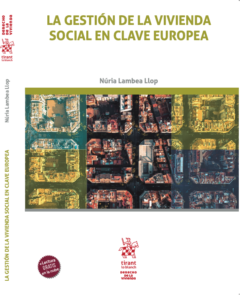 Published by Tirant lo blanch (2022), this book is the result of the author’s PhD thesis with an international mention and recognised with the Extraordinary PhD Award of the Rovira i Virgili University.
Published by Tirant lo blanch (2022), this book is the result of the author’s PhD thesis with an international mention and recognised with the Extraordinary PhD Award of the Rovira i Virgili University.
Here will find the reader an in-depth analysis not only of social housing management models in Spain, but also of comparative management models; specifically, the English housing association model and the Dutch woningcorporatie model, which are private non-profit management ones. Thus, this book aims to respond to the existing (and still unsolved) need in Spain for a common and functional legal framework for social housing providers and managers, which allows structuring and improving the efficiency of an atomised and unstructured sector.
The formal presentation of the book took place on May 12th 2022, 5pm, at the Rovira i Virgili University (Sala de Graus, Campus Catalunya, Tarragona). The recording can be found at the following link.
El fideicomiso inmobiliario y la inversión extranjera como instrumentos para mitigar el déficit habitacional [The real estate trust and foreign investment as instruments to mitigate the housing deficit]
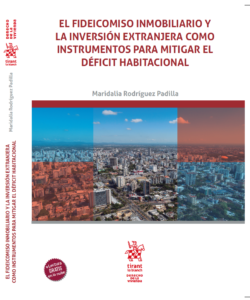 This book covers the lack of housing affecting the Dominican Republic, the legal framework and tax treatment of local and foreign real estate investments, and the real estate trust [fideicomiso] as an instrument of collective investment. On the one hand, this book highlights the need to amend Act 189-11, on the mortgage market and the trust, in order to make the real estate trust an instrument to increase the housing stock in this country. This piece of legislation aims at boosting the financial market and the real estate sector, while encouraging private participation in solving the housing problem and introducing new instruments for raising funds for this purpose. On the other hand, the book analyses the lack of active policies for attracting foreign investment to solve the Dominican lack of housing. Moreover, there is a need to promote real estate investment trusts specialized in renting, rent to own or other types of intermediate tenures, being methods for accessing to housing and for increasing national or foreign private investment (direct and indirect). Finally, this book examines the convenience to promote an ad hoc regulation of trusts dedicated to the Dominican real estate rental market (Dominican REITs) that guarantees a minimum investment in affordable housing.
This book covers the lack of housing affecting the Dominican Republic, the legal framework and tax treatment of local and foreign real estate investments, and the real estate trust [fideicomiso] as an instrument of collective investment. On the one hand, this book highlights the need to amend Act 189-11, on the mortgage market and the trust, in order to make the real estate trust an instrument to increase the housing stock in this country. This piece of legislation aims at boosting the financial market and the real estate sector, while encouraging private participation in solving the housing problem and introducing new instruments for raising funds for this purpose. On the other hand, the book analyses the lack of active policies for attracting foreign investment to solve the Dominican lack of housing. Moreover, there is a need to promote real estate investment trusts specialized in renting, rent to own or other types of intermediate tenures, being methods for accessing to housing and for increasing national or foreign private investment (direct and indirect). Finally, this book examines the convenience to promote an ad hoc regulation of trusts dedicated to the Dominican real estate rental market (Dominican REITs) that guarantees a minimum investment in affordable housing.
This book is based on the Dominican experience, but the conclusions reached make it applicable to any similar legal financial instrument used as a housing policy in any regulation.
Here you may find the book presentation.
La intermediación inmobiliaria ante los nuevos retos de la vivienda [The real estate brokerage profession in the face of new housing challenges]
The book “La intermediación inmobiliaria ante los nuevos retos de la vivienda” published by Tirant lo blanch (2021) is the result of a doctoral thesis with international mention and winner of the Extraordinary Award.
This book reconsiders the profession of real estate brokerage in Spain which in Spain is liberalized or deregulated since 2000. This means that, to become real estate agent in this country, it is not mandatory to have a specific academic training or to be registered in any official institution. The work shows the need to clarify the regulatory framework of real estate agents, given the consequences of the economic and real estate crisis of 2007 -which still persists today with the other one caused by COVID-19- and the new paradigm born by the impact of technology on the profession (proptech). The nature of the contractual relationship with these professionals is also studied from a legal point of view; how the profession is regulated in other European countries and the need for them to have sufficient and adequate academic training to provide added value in the services they provide through a university degree.
Throughout this work it is explained the profession responds to a general interest and that the current liberalization situation does not contribute to achieving the necessary legal certainty in the entire real estate transaction process, nor the protection of consumers or people who have access to a home, nor does it contribute to achieving the right to everyone to access a decent and adequate home.
This book is not only of interest to real estate agents, who can find a manual related to their profession with proposals for new functions and also for different modalities of carrying out the intermediation, but also for any professional linked to the housing sector and even the Public Administration itself, offering it criteria that help it identify how this profession affects the general interest.
The presentation of the book was held on April 21, 2021 virtually and was in charge of Mr. Ignacio Escalante, assistant director of the publishing department of Editorial Tirant lo Blanch, Mr. Gerard Duelo Ferré, president of the General Council COAPI of Spain and president of the Professional Association of Real Estate Agents of Barcelona and Mr. José Antonio Mas Flores, president of the Professional Association of Real Estate Agents of Tarragona. The event was attended by 60 people.
The recording of the event can be found here.
On 04-20-2021, this interview with the author was published in the Diari La Ciutat.
Condominium Governance and Law in Global Urban Context

This book examines condominium, property, governance, and law in international and conceptual perspective and reveals this urban realm as complex and mutating.
Condominiums are proliferating the world over and transforming the socio-spatial organization of cities and residential life. The collection assembles arguably the most prominent scholars in the world currently working in this broad area and situated in multiple disciplines, including legal and socio-legal studies, political science, public administration, and sociology. Their analyses span condominium governance and law on five continents and in nine countries: the United States (US), China, Australia, the United Kingdom (UK), Canada, South Africa, Israel, Denmark, and Spain. Neglected issues and emerging trends related to condominium governance and law in cities from Tel Aviv to Chicago to Melbourne are discerned and analysed. The book pursues fresh empirical inquiries and cogent conceptual engagements regarding how condominiums are governed through law and other means. It includes accounts of a wide range of governance difficulties including chronic anti-social owner behaviour, short-term rentals, and even the COVID-19 pandemic, and how they are being dealt with. By uncovering crucial cross-national commonalities, the book reveals the global urban context of condominium governance and law as empirically rich and conceptually fruitful.
The book will appeal to researchers and students in socio-legal studies, law, sociology, political science, urban studies, and public administration as well as journalists, social activists, policymakers, and condo owners/board members.
La gran apuesta. Avaricia. El beneficio sin responsabilidad [The Big Short. Greed. The profit without liability]
 “The Big Short” (2015) is a film that narrates the frenzied activity of three groups of financiers who bet that the mortgage market would collapse a few years before it ended up doing so in 2007, thus making a fortune. This book analyzes how and why they did it, the causes and consequences of the collapse, their perpetrators and their liabilities. Greed becomes the engine of the plot and the bankruptcy of the ubi emolumentum ibi onus principle several times along the mortgage securitization chain, the ultimate cause of a recession that has continued to this day in the form of an economic, political, moral and territorial crisis, aggravated in 2020 by that of COVID-19. The work will place the reader in the position of deciding whether or not those who became rich as a result of the misery of hundreds of thousands of unemployed and evicted people are better than those who had profited for decades by forging a mortgage market as fragile as a house of cards.
“The Big Short” (2015) is a film that narrates the frenzied activity of three groups of financiers who bet that the mortgage market would collapse a few years before it ended up doing so in 2007, thus making a fortune. This book analyzes how and why they did it, the causes and consequences of the collapse, their perpetrators and their liabilities. Greed becomes the engine of the plot and the bankruptcy of the ubi emolumentum ibi onus principle several times along the mortgage securitization chain, the ultimate cause of a recession that has continued to this day in the form of an economic, political, moral and territorial crisis, aggravated in 2020 by that of COVID-19. The work will place the reader in the position of deciding whether or not those who became rich as a result of the misery of hundreds of thousands of unemployed and evicted people are better than those who had profited for decades by forging a mortgage market as fragile as a house of cards.
– Review by Dr. Ángeles Galiana Saura, Cuadernos Electrónicos de Filosofía del Derecho
The recording of the book’s presentation can found here.
La tokenización de bienes en blockchain. Cuestiones civiles y tributarias [Tokenization of assets in blockchain. Civil and tax law issues]

This book is dedicated to the study of the legal consequences of the tokenization of the ownership and rights in rem in digital tokens that operate on a blockchain. This technological practice makes it possible to represent a certain right (for example, home ownership) on a digital file, which can be negotiated quickly or even automatically thanks to smart contracts, while it is automatically registered in a cryptographically protected blockchain. This enables, at least theoretically, a faster, cheaper and more transnational system for the transmission of goods. However, this system presents new challenges for our civil and tax legislation.
Consequently, the study is carried out in an all-encompassing way from the point of view of Spanish civil law, while analyzing the codes of certain smart contracts from the perspective of computer sciences. To this end, authors determine the legal nature of tokens; the opportunities and challenges of representing ownership and rights in rem; the requirements to create, transmit and validly extinguish said rights through smart contracts; and the main challenges posed by the taxation of this technological practice. This book will be useful both for researchers and practitioners of Law and Computer Sciences, as well as for the law-maker, for those who codify smart contracts, and for people interested in the development of legal tech solutions.
Los años de la crisis de la vivienda [The times of the housing crisis]
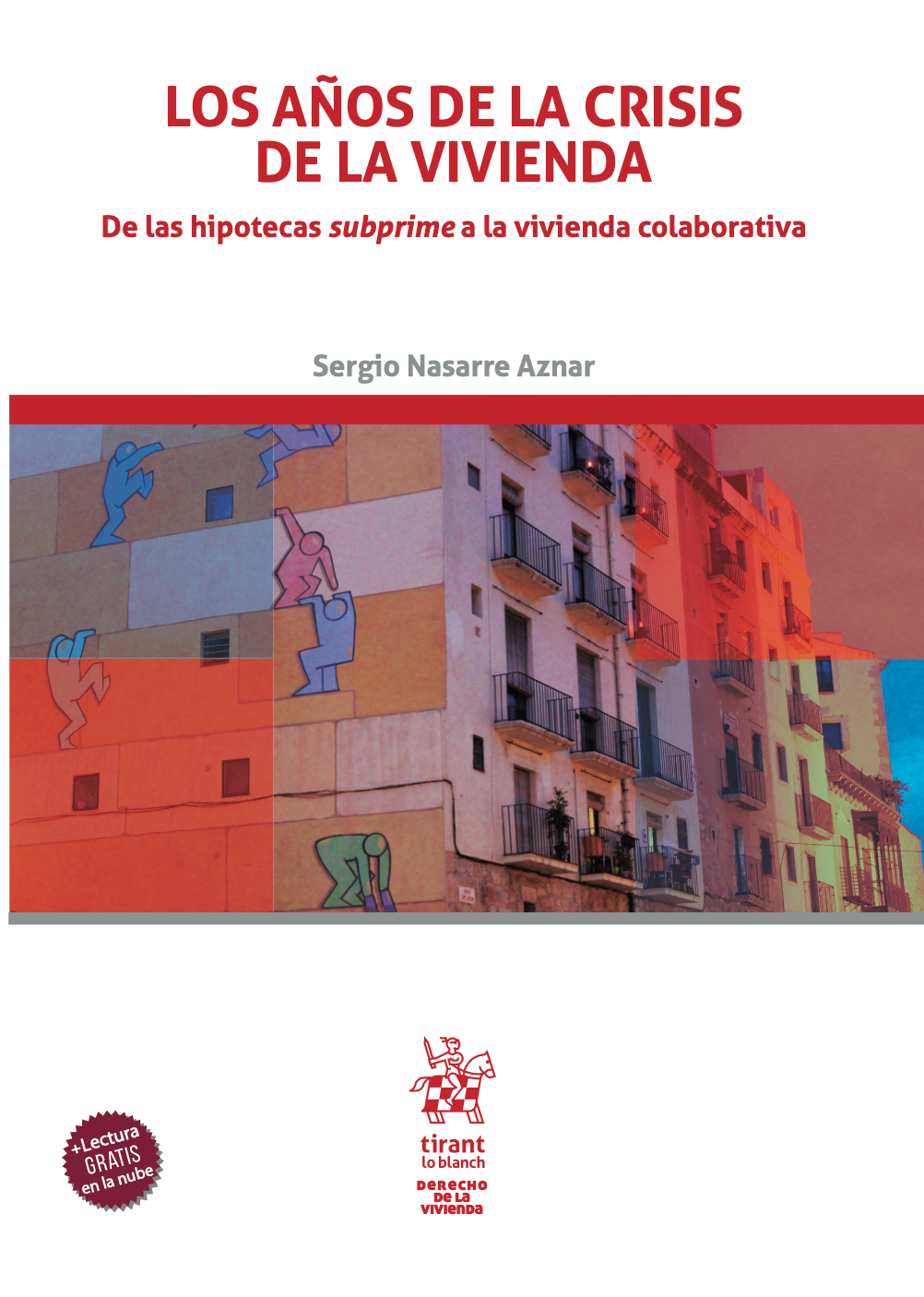 Prof. Dr. Sergio Nasarre Aznar is the author of this book, which is the result of eight years of research covering fourteen years of housing crisis, which begins with the subprime crisis in the United States and ends up claiming a specific and coherent legal framework for housing, the need to diversify the forms of housing tenures and make them really functional, as well as justifying a reorientation of the active and passive operations of the mortgage market.
Prof. Dr. Sergio Nasarre Aznar is the author of this book, which is the result of eight years of research covering fourteen years of housing crisis, which begins with the subprime crisis in the United States and ends up claiming a specific and coherent legal framework for housing, the need to diversify the forms of housing tenures and make them really functional, as well as justifying a reorientation of the active and passive operations of the mortgage market.
The work critically analyzes the legal keys that explain the generation of the crisis, its globalization and its effects and reactions in Spain, placed in a European context. Through them, the reader can find answers or, at least, form an opinion in complex questions such as: does or should everyone have the right to own their home ?; Is “sharing” or “accessing” a home the real and universal alternative to buying it or is it necessary to re-elaborate secular institutions to guarantee the necessary stability and affordability ?; do we have or do not have a strong and guarantee mortgage system in Spain if we compare it with the American one?; have we performed worse in Spain than they have done in other European countries on issues of access and loss of housing?; what has the housing crisis had to do with bad banking practices ?; have the measures that have been taken on either side of the Atlantic after the outbreak of the crisis and in prevention of a future one been sufficient?; is it good for some judges to “invent” the law to protect the weak against the inaction of the legislator and social pressure?; should everyone necessarily live in the same big cities? In short, does the problem of access to housing have a solution?
Unfortunately, there are no simple solutions to complex problems. However, those related to housing can be identified and treated from a scientific perspective, far from partisan interests, that can generate enough social impact and help those in need of housing, operators and policy makers to take better decisions. This is what this work intends.
- Review by Dr. Fernando Zunzunegui Pastor
- Review by Dr. Francisco Javier Gómez Galligo
- Review by Prof. Dr. Pedro A. Munar Bernat
- Review by Dr. Maridalia Rodríguez
- Review by Dr. Cristina Argelich
- Review by Prof. Dr. Esther Muñiz Espada
- Review by Dr. Rosa M. Garcia Teruel
- Review by Colegio de Registradores de la Propiedad
The formal act of presentation of the book was held on June 18, 2020 and was given by Mr. Salvador Vives, director of the Editorial Tirant lo Blanch, and Mrs. Beatriz Corredor, president of the Red Eléctica Group and former housing minister . One hundred people participated. The recording of the event can be found here.
The book has been incorporated into the Real Estate Literature Showcase, where there is also an interview with the author.
On 9th August 2020 La Vanguardia published this interview with the author. See also this one at Cataluña Plural of 18th September 2020.
La Sustitución de la Renta por la Rehabilitación o Reforma de la Vivienda en los Arrendamientos Urbanos [Rehabilitation in lieu of rent of home in urban leases]
 The present work focuses on the study of rehabilitation in lieu of rent, which was introduced in 2013 in article 17.5 of the Spanish Urban Leasing Law and which persists in the last reform of this by RDL 7/2019. This new figure allows a person, often with limited economic resources, to access a rental home without paying a rent in money, but rehabilitating it, maintaining all the guarantees of the LAU, which means overcoming traditional leases ad meliorandum. Rehabilitation in lieu of rent contributes, therefore, to two of the great challenges that have manifested themselves especially after the economic crisis of 2007: the lack of affordability in access to housing in a context of rising prices of urban housing leases and the growing need to improve the state of rehabilitation of the housing stock. Thus, this work that the reader holds in his/her hands analyzes the current legal framework of rehabilitation by income, identifies the problems that can undermine its full development and proposes the corresponding improvements, while determining if this figure, according to the current legislative framework, it can be a real housing alternative, especially for the most disadvantaged sectors of the population. For these purposes, the historical precedents of the figure are analyzed, their legal nature, the problems that can be found in their application combined with the rest of the provisions of the Law of Urban Leases and their overlap in the rest of the legal system, as well as their taxation, its civil liability regime and its corresponding peculiarities in relation to the eviction process. The analysis culminates in a contract model and a proposed regulation.
The present work focuses on the study of rehabilitation in lieu of rent, which was introduced in 2013 in article 17.5 of the Spanish Urban Leasing Law and which persists in the last reform of this by RDL 7/2019. This new figure allows a person, often with limited economic resources, to access a rental home without paying a rent in money, but rehabilitating it, maintaining all the guarantees of the LAU, which means overcoming traditional leases ad meliorandum. Rehabilitation in lieu of rent contributes, therefore, to two of the great challenges that have manifested themselves especially after the economic crisis of 2007: the lack of affordability in access to housing in a context of rising prices of urban housing leases and the growing need to improve the state of rehabilitation of the housing stock. Thus, this work that the reader holds in his/her hands analyzes the current legal framework of rehabilitation by income, identifies the problems that can undermine its full development and proposes the corresponding improvements, while determining if this figure, according to the current legislative framework, it can be a real housing alternative, especially for the most disadvantaged sectors of the population. For these purposes, the historical precedents of the figure are analyzed, their legal nature, the problems that can be found in their application combined with the rest of the provisions of the Law of Urban Leases and their overlap in the rest of the legal system, as well as their taxation, its civil liability regime and its corresponding peculiarities in relation to the eviction process. The analysis culminates in a contract model and a proposed regulation.
The recording of the book’s presentation may be found here.
Loss of homes and evictions across Europe
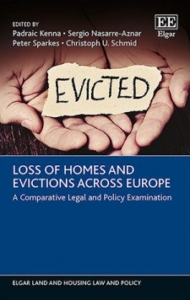
The loss of a home can lead to major violations of a person’s dignity and human rights. Yet, evictions take place everyday in all countries across Europe. This book provides a comparative assessment of human rights, administrative, procedural and public policy norms, in the context of eviction, across a number of European jurisdictions. Through this comparison the book exposes the emergence of consistent, Europe-wide standards and norms.
With contributions from experts across Europe, the chapters provide an assessment of eviction procedures in 11 jurisdictions, including Germany, France, Spain, the Netherlands and the United Kingdom. Each chapter examines a number of factors relating to evictions in the respective jurisdiction, such as, the human rights and legal framework, nature and extent of evictions taking place, risk factors leading to evictions and relevant best practice guidance. All together, this book will make a significant contribution to the understanding of the similarities and differences between eviction policies across European states.
As the first work of it’s kind to provide an in-depth comparison of eviction policies across Europe, Loss of Homes and Evictions Across Europe will be of great interest to those who are researching European housing law and human rights law and policy. Housing law and public policy makers, and those working within associated European institutions, will also find the data and accompanying analysis invaluable for informing their work.
Una nueva regulación para los arrendamientos urbanos de vivienda en un contexto europeo [A new regulation for housing urban leases in a European context]
 In this book a critical study of the current housing lease contract in Spain is carried out and a new regulation is proposed, which is considered essential to correct the existing dysfunctions in the rental market (lowest rate in Western Europe, wide black market, unaffordability) and, in particular, to serve as a real alternative (and not merely frictional) to ownership as a form of access to housing. The functional model we propose pursues, on the one hand, stability (promoting indefinite contracts), affordability (promoting referenced rent systems) and flexibility (facilitating the withdrawal and subleasing) of the tenant; and, on the other hand, profitability (referenced rent systems at market prices), guarantees and security (deposits, surety bonds or a possible legal pledge) of the lessor. To this end, the historical law, positive law and comparative law of countries with low (Greece, Portugal, Italy, Malta and Spain) and higher rental rates in Europe (Germany, Switzerland and Austria) are considered. In addition, to reinterpret these regulations according to the right to housing, the reasonableness and proportionality of the proposed measures are analyzed in order to find a balance between the rights and obligations of the parties.
In this book a critical study of the current housing lease contract in Spain is carried out and a new regulation is proposed, which is considered essential to correct the existing dysfunctions in the rental market (lowest rate in Western Europe, wide black market, unaffordability) and, in particular, to serve as a real alternative (and not merely frictional) to ownership as a form of access to housing. The functional model we propose pursues, on the one hand, stability (promoting indefinite contracts), affordability (promoting referenced rent systems) and flexibility (facilitating the withdrawal and subleasing) of the tenant; and, on the other hand, profitability (referenced rent systems at market prices), guarantees and security (deposits, surety bonds or a possible legal pledge) of the lessor. To this end, the historical law, positive law and comparative law of countries with low (Greece, Portugal, Italy, Malta and Spain) and higher rental rates in Europe (Germany, Switzerland and Austria) are considered. In addition, to reinterpret these regulations according to the right to housing, the reasonableness and proportionality of the proposed measures are analyzed in order to find a balance between the rights and obligations of the parties.
Un nou dret d’arrendaments urbans per a afavorir l’accés a l’habitatge [A new urban leases Law to facilitate access to housing]
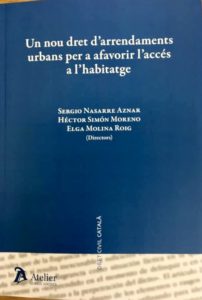 After ten years of the beginning of the crisis, the problem of access to housing persists. The reform of the Law of Urban Leases by Law 4/2013 has not managed to increase interest for tenancies as a form of housing tenure (which has only grown due to the persistent restriction of access to the mortgage loan) and has caused a considerable increase of the rents in certain neighborhoods of some large cities. After seven years studying and comparing the rental regimes of the 28 member countries of the European Union, the researchers of the UNESCO Chair of Housing of the Rovira University and Virgili propose in this book an urban leasing model based on what they have the three European countries with a higher rental sector (Germany, Switzerland and Austria), even proposing improvements. This model served as the basis for the guidelines of a working group organized by the Ministry of Housing of the Generalitat of Catalonia during the years 2016 and 2017 and now has the opportunity to support a new law of urban leases that, considering the interests and in the balance of the two parts of the contractual relationship, can favor access to tenancies and make it a real alternative to homeownership.
After ten years of the beginning of the crisis, the problem of access to housing persists. The reform of the Law of Urban Leases by Law 4/2013 has not managed to increase interest for tenancies as a form of housing tenure (which has only grown due to the persistent restriction of access to the mortgage loan) and has caused a considerable increase of the rents in certain neighborhoods of some large cities. After seven years studying and comparing the rental regimes of the 28 member countries of the European Union, the researchers of the UNESCO Chair of Housing of the Rovira University and Virgili propose in this book an urban leasing model based on what they have the three European countries with a higher rental sector (Germany, Switzerland and Austria), even proposing improvements. This model served as the basis for the guidelines of a working group organized by the Ministry of Housing of the Generalitat of Catalonia during the years 2016 and 2017 and now has the opportunity to support a new law of urban leases that, considering the interests and in the balance of the two parts of the contractual relationship, can favor access to tenancies and make it a real alternative to homeownership.
Reformando las tenencias de la vivienda. Un hogar para tod@s [Reforming housing tenures. A home for all]
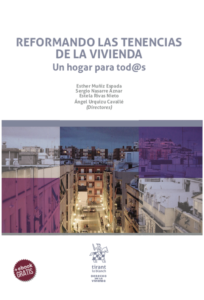 “Security of tenure is a cornerstone of the right to adequate housing; one can not exist without the other.” With this sentence begins the prologue to the present work Leilani Farha, Special Rapporteur of the UN for housing and describes very accurately the importance of the proper functioning of housing tenures to ensure the right to it. In the book, several authors, academics and practitioners, national and international, make a critical tour of the traditional forms of tenure of housing -property and rent- in Spain, analyzing in an interdisciplinary way its operation and proposing mechanisms to optimize them so that they fulfill the function they have entrusted.
“Security of tenure is a cornerstone of the right to adequate housing; one can not exist without the other.” With this sentence begins the prologue to the present work Leilani Farha, Special Rapporteur of the UN for housing and describes very accurately the importance of the proper functioning of housing tenures to ensure the right to it. In the book, several authors, academics and practitioners, national and international, make a critical tour of the traditional forms of tenure of housing -property and rent- in Spain, analyzing in an interdisciplinary way its operation and proposing mechanisms to optimize them so that they fulfill the function they have entrusted.
Systematically, the work is divided into four parts: Right to housing and housing policies, Towards a new framework of urban housing leases, Home ownership, Mortgage and Registration and, finally, the Search for Affordable Taxation to promote the access to housing.
This volume is the first issue of the new Collection of the Tirant lo Blanch publishing house on “Housing Law”, dedicated to the study and diffusion of this topic from its most varied perspectives and with an innovative methodology, where the reader can find the most updated information and the answers to the new challenges of the complex phenomenon of housing.
La Optimización de la Hipoteca Inversa Desde la Perspectiva Europea y Norteamericana [The optimization of the reverse mortgage from a European and North Americal perspecives]
The progressive aging of the Spanish population and the increase of dependents means that more public resources have to be allocated to cover the needs of these groups. In a context of uncertainty, insufficiency of public resources to meet the payment of public pensions and subsidies to dependence and dedication of the resources of the elderly to sustain the family economy, the search by these groups of alternative systems of private financing, such as the reverse mortgage, is understandable.
This institution was regulated for the first time in 2007 in order that these people could obtain liquidity from the real estate property and thus complement the public subsidy that they could receive. Although it was a mortgage product that had some success in its infancy, the truth is that currently it is not part of the mortgage offer of credit institutions [in Spain].
For this reason, the present monograph analyzes how the current regulation of the reverse mortgage could be optimized to make it attractive for citizens and legal-economic operators and, in particular, the relevant factors for its hiring, the risks assumed by both the lenders as the applicants and the potential role that can play in the welfare state of the elderly and dependent in Spain. For this purpose, this institution is analyzed from a comparative perspective, in particular its treatment in EU Law and in Anglo-Saxon legal systems, such as the English, the Irish or the USA, where the reverse mortgage has achieved a certain grade of success.
Renting residential property in twenty-first century Malta
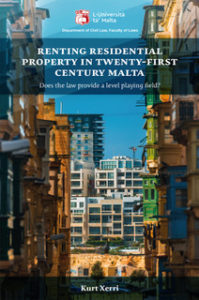 Since the liberalisation of the private rental market in 1995, the Maltese legislator has based himself on the assumption that the landlord and the tenant are two free and equal contracting parties, entering any ordinary bilateral agreement. Whilst this might appear true in theory, actual practices and experiences reveal a number of difficulties that hinder tenants from protecting their interests. This study aims precisely to test the legislator’s hypothesis and to assess whether, from the very moment tenants approach an estate agent to identify a property to rent in Malta, to the time when they must determine the fairness of the price, the quality of the property or the adequacy of the agreement, and further till the settlement of the utility bills, there really exists a balance between the respective contracting parties.
Since the liberalisation of the private rental market in 1995, the Maltese legislator has based himself on the assumption that the landlord and the tenant are two free and equal contracting parties, entering any ordinary bilateral agreement. Whilst this might appear true in theory, actual practices and experiences reveal a number of difficulties that hinder tenants from protecting their interests. This study aims precisely to test the legislator’s hypothesis and to assess whether, from the very moment tenants approach an estate agent to identify a property to rent in Malta, to the time when they must determine the fairness of the price, the quality of the property or the adequacy of the agreement, and further till the settlement of the utility bills, there really exists a balance between the respective contracting parties.
As such, the research proves that both the law as well as the policies that are currently in place do not concede tenants the required guarantees in terms of knowledge and transparency, in order to approach negotiations with the necessary strength.
Tenancy law and housing policy in Europe. Towards regulatory equilibrium
 Tenancy law has developed in all EU member states for decades, or even centuries, but constitutes a widely blank space in comparative and European law. This book fills an important gap in the literature by considering the diverse and complex panorama of housing policies, markets and their legal regulation across Europe. Expert contributors argue that that while unification is neither politically desired nor opportune, a European recommendation of best practices including draft rules and default contracts implementing a regulatory equilibrium would be a rewarding step forward.
Tenancy law has developed in all EU member states for decades, or even centuries, but constitutes a widely blank space in comparative and European law. This book fills an important gap in the literature by considering the diverse and complex panorama of housing policies, markets and their legal regulation across Europe. Expert contributors argue that that while unification is neither politically desired nor opportune, a European recommendation of best practices including draft rules and default contracts implementing a regulatory equilibrium would be a rewarding step forward.
European Condominium Law

Work coordinated by Professor Cornelius van der Merwe on condominiumsin Europe. The book compares 21 jurisdictions, based on their origin and their uses and analyzing their points in common and main differences.
It includes ten practical cases solved for each of the jurisdictions studied following the methodology of the Common Frame of Reference.
Bienes en común [Goods and property held in common]
The present work collects under the title “Bienes en común” [Property held in common] a series of assumptions in which the same good is had by two or more people. Its objective is, therefore, to go beyond “joint property” so as to be able to include assumptions that imply the need to organize the relations of different people on the same thing, such as trust or intermediate tenures, of an important practical use, but are not usually included in the “classic” studies of co-ownership.
 This innovative perspective, combined with studies with up-to-date jurisprudence of essential institutions such as the Roman co-ownership, also moves to the approach given to the treatment of condominiums (both in the Spanish legislation and in the Civil Code of Catalonia) through real situations, differential treatment to under-researched institutions such as Canary Islands servitude and analysis of other institutions developed in foral rights, such as partial exploitation rights. The work has an importantinterdisciplinary character , including studies of civil law, insolvency, tax and housing. It brings together national and international authors, academics and practitioners, experts in real rights who provide a global vision of the problem and allow special studies on the various types of co-ownership in England and Wales, Germany, Ireland and Portugal.
This innovative perspective, combined with studies with up-to-date jurisprudence of essential institutions such as the Roman co-ownership, also moves to the approach given to the treatment of condominiums (both in the Spanish legislation and in the Civil Code of Catalonia) through real situations, differential treatment to under-researched institutions such as Canary Islands servitude and analysis of other institutions developed in foral rights, such as partial exploitation rights. The work has an importantinterdisciplinary character , including studies of civil law, insolvency, tax and housing. It brings together national and international authors, academics and practitioners, experts in real rights who provide a global vision of the problem and allow special studies on the various types of co-ownership in England and Wales, Germany, Ireland and Portugal.
Revista “Teoría y Derecho”. Número especial sobre “Hipoteca y vivienda” [Special issue of the Journal “Teoría y Derecho”: “Mortgage and housing”]
Nine articles on the issue of “Mortgage and housing” cover the core issues of current relevance such as the ro le of property ownership at the origin of the crisis and the consequences it entails, the European Mortgage Directive 2014/17/EU, the Spanish mortgage reforms since 2007, a comparison between the mortgage situation and housing in Spain and Ireland, a critical analysis of the mortgage (What is wrong with our mortgage?), floor clauses, solvency assessment in the granting of mortgage credits, human rights and housing and whether renting can really be an alternative to homeownership in three Mediterranean countries (Spain, Portugal and Malta).
le of property ownership at the origin of the crisis and the consequences it entails, the European Mortgage Directive 2014/17/EU, the Spanish mortgage reforms since 2007, a comparison between the mortgage situation and housing in Spain and Ireland, a critical analysis of the mortgage (What is wrong with our mortgage?), floor clauses, solvency assessment in the granting of mortgage credits, human rights and housing and whether renting can really be an alternative to homeownership in three Mediterranean countries (Spain, Portugal and Malta).
La propiedad compartida y la propiedad temporal [The shared ownership and the temporal ownership]
This book is dedicated to analyzing the two new ways to access housing and other assets that have recently been incorporated into the Civil Code of Catalonia by Law 19/2015: shared ownership and temporary owership.
 These are new types of flexible, stable and affordable ownership that represent an alternative to the two traditional tenures of housing, absolute ownership and rent, thus overcoming this dichotomy that has led thousands to eviction and precariousness. Both obey the need to offer families a sustainable continuum of housing tenures, as reflected in the New Urban Agenda of the UN approved in Habitat III (Quito, October 2016) for the next 20 years.
These are new types of flexible, stable and affordable ownership that represent an alternative to the two traditional tenures of housing, absolute ownership and rent, thus overcoming this dichotomy that has led thousands to eviction and precariousness. Both obey the need to offer families a sustainable continuum of housing tenures, as reflected in the New Urban Agenda of the UN approved in Habitat III (Quito, October 2016) for the next 20 years.
The study is carried out from a legal and economic point of view and in an all-encompassing and practical way, analyzing all aspects of the figures. In this way, it wants to be useful both to lawmakers, researchers in law and real estate economics, as well as practitioners in drafting their contracts and in their participation in real estate transactions.
Private Communities and Urban Governance
Edited by Dr. Amnon Lehavi, Atara Kaufman Professor of Real Estate at the Radzyner School of Law at the Interdisciplinary Center in Herzliya.
This book offers an interdisciplinary and comparative study of the complex interplay between private versus public forms of organization and governance in urban residential developments. Bringing together top experts from numerous disciplines, including law, economics, geography, political science, sociology, and planning, this book identifies the current trends in constructing the physical, economic, and social infrastructure of residential communities across the world. It challenges much of the conventional wisdom about the division of labor between market-driven private action and public policy in regulating residential developments and the urban space, and offers a new research agenda for dealing with the future of cities in the twenty-first century. It represents a unique ongoing academic dialogue between the members of an exceptional group of scholars, underscoring the essentially of an interdisciplinary and comparative approach to the study of private communities and urban governance. As such, the book will appeal to a broad audience consisting of policy-makers, practitioners, scholars, and students across the world, especially in developing countries and transitional and emerging economies.


